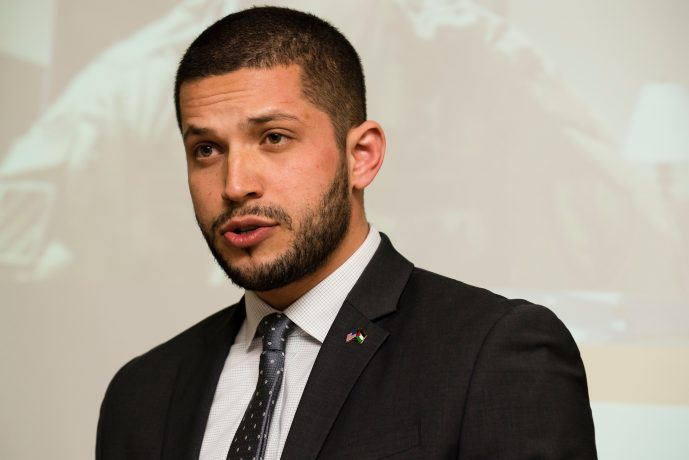Parting advice from a new graduate
Over the course of the summer, I’ll be sharing advice for incoming students and for applicants. Mahmoud Jabari, who graduated from the MALD program in May, offered up his tips, which will be helpful for both groups.

In April 2015, I chose to attend The Fletcher School of Law and Diplomacy for one main reason: the unique structure of Fletcher’s academic programs and how they intersect and overlap. What does that mean?
Basically, it means the opportunity to build my degree with courses across a range of fields. Within the Master of Arts in Law and Diplomacy are twenty-plus concentrations and each student has to choose two. I chose to focus on International Business Relations and International Political Economy, and at the same time pursue a certificate in Strategic Management, one of the five professional certificates Fletcher offers.
My classes ranged from law-oriented areas such as international trade and international business transactions, to economics and finance including underground finance and economics of public policy. I wanted to fulfill two goals at Fletcher. The first was to gain better understanding of business in the context of international relations and how they influence and shape each other. The second was to develop tangible skills that would enable me to be an active, effective, and strategic professional in international business strategy and public-private partnerships.
As I recently graduated from Fletcher, I wanted to share some thoughts and takeaways from my two years here, in addition to the year I took to work full time.
Most important: Never cease asking questions.
When I entered Fletcher in September 2015, I was overwhelmed by the diversity of talent, professional backgrounds, and experiences of my fellow students. I had just finished my undergraduate studies in May of that year. When I did my readings for a class, my goal was to be prepared to give an answer the next day in or outside of class. While answers are important, they are not necessarily and always a solution. In fact, at Fletcher, I learned the opposite: It is all about the questions. Questions that arise from professors and from students’ input, or those a reading should provoke. Whether it is the “what,” the “how,” or the “what if,” questions matter. I am leaving Fletcher driven by questions more than answers.
Among my other thoughts: The impact of professors goes beyond a classroom or class materials.
There has not been one class at Fletcher where I did not leave with new knowledge, questions, frameworks, and ideas. Nonetheless, those that have been the most fun and enjoyable were when professors inspired students by sharing their stories. Professors’ dedication, in time and effort, and their stories from their professional careers, research, and experiences left me with advice, learning, and lessons. Last semester, I took a class on Leading the Global Corporation with Professor Richard Thoman. His stories about his experience making business deals, leading business expansions, and managing change in big-name firms were invaluable. The insights of Professor Ibrahim Warde, my thesis advisor, has enriched my independent study on the “Palestinian Quest for Statehood.” His expertise and experience at the nexus of economics, politics, and history were invaluable to my work. The same applies to my experience in two classes with Professor Joel Trachtman.
Internships matter but there are tons of other possibilities.
By the beginning of my second semester, internships became the dominant topic and concern of most students. For those looking for opportunities in the business world, the conversation started even earlier. It is overwhelming. If you cannot find something on time, it can be intimidating. I got my internship in early June and started around mid-June. It worked out for me, but I remind myself that I could have done something else, such as field research, learning a new language, or a summer program in a relevant field. Don’t freak out about internships.
Find time to get to know people.
Meeting students and learning about what they have done before Fletcher was my favorite part of my time here. Every student has a unique life story. They worked with refugees, or on global or national policy issues, new business ventures, interesting research projects, and so many other areas in a wide variety of fields. Between homework, assigned readings, and exams, time is limited. Nonetheless, try to find time to meet fellow students, and learn about the work they have done. I enjoyed it, but I know that I could have dedicated even more time to it.
Have fun and don’t rush.
Between my first and second year at Fletcher, I took a year off to work full-time as an Economic Development Associate at the Office of the Quartet (the United Nations, U.S., European Union, and Russia) in Jerusalem. It was a great opportunity to bring one year of Fletcher education to the field, build professional experience, and bring that mix back to Fletcher for my second year. It enriched my time and education at Fletcher, widened my horizons, and strengthened my confidence. I highly recommend such a break to those who can afford to take the time to do it. Nonetheless, time flew by, so it’s also important not to rush.
Ending my Fletcher chapter is a bittersweet feeling — a mix of sadness, happiness, pride, and gratitude. Time will tell whether I fulfilled my goals while at Fletcher. However, I know that my education at Fletcher has helped me build an understanding of my areas of study and beyond and helped me develop the skills I will need to succeed. I will forever cherish my experience and memories here.
Thank you for the kind words, Blaise! I’ll make sure that Mahmoud sees your comment.
Thank you very much Mr Jabari. You add a tremendous motivation on my dream of being a Fletcher School of Law student.